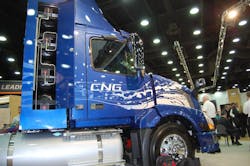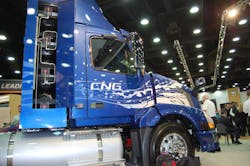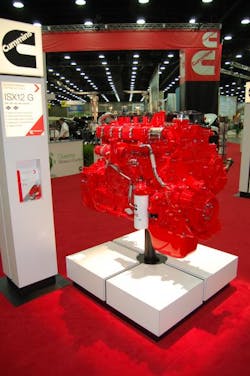The issue is a salient one for truckers because one of the major advantages touted for making such a switch is the current dirt-cheap price for natural gas compared to pricier diesel.
Indeed, it is the wide spread between the two – a difference of anywhere from $2 or more per equivalent gallons – that’s being relied upon as payback for the far-higher initial investment required for trucks fired by either compressed natural gas (CNG) or liquefied natural gas (LNG).
To that end, then, a new study from the American Clean Skies Foundation (ACSF) claims such a massive transition to natural gas for light, medium, and heavy vehicles over the next decade shouldn’t impact prices much at all.
“We found that the estimated level of natural gas demand from NGVs, even under the most optimistic scenario, accounted for only about 2%t of the overall market by 2025, and the incremental rise in fuel prices for this high growth scenario was only approximately 25 cents per MMBtu [one million British thermal units, a measure of energy content] or 5%,” said Gregory Staple, ACSF’s CEO and co-author of the report dubbed Driving on Natural Gas: Fuel Price and Demand Scenarios for Natural Gas Vehicles to 2025.“That’s largely because we expect the growth in natural gas vehicles over the next decade to provide adequate time for supply and infrastructure developments to keep pace with demand, and thus to moderate any incremental natural gas price impact,” he added.
ACSF’s optimistic growth scenario included high adoption rates of both light duty and heavy duty NGVs. In this scenario, the transportation sector’s natural gas demand grew from 57 billion cubic feet (Bcf) in 2013 to 711 Bcf in 2025, which equates to roughly 2.3% of total demand that year.
The scenario estimated roughly 2.4 million NGVs on the road by 2025, of which 480,000 are heavy duty trucks, with the effect on 2025 natural gas prices across the scenarios ranging from an additional 3 cents to 27 cents per MMBtu.
In the report’s highest NGV growth scenario, more than 180 million barrels of petroleum fuels are displaced by natural gas in 2025 and almost 1 billion barrels of oil consumption avoided cumulatively from 2013 to 2025, noted report co-author Patrick Bean.
“Our analysis should give businesses, consumers, regulators and political leaders’ confidence that a plausible transition to NGVs can achieve energy security objectives while having minimal impact on natural gas prices and competition for the fuel,” he added.
The report also found that retail prices for CNG and LNG will remain attractive compared to diesel and gasoline even if natural gas prices increase significantly.
Currently, about 20% of the retail CNG price is attributable to the raw natural gas cost and even if natural gas prices double from $4/MMBtu to $8/MMBtu, the commodity component of retail CNG prices will be about 40%, and CNG will cost about $2.20 per gallon of gasoline equivalent, ACSF’s findings indicate.
Something to think about at least as the trucking industry continues to debate switching from diesel to natural gas to power its vehicles.


